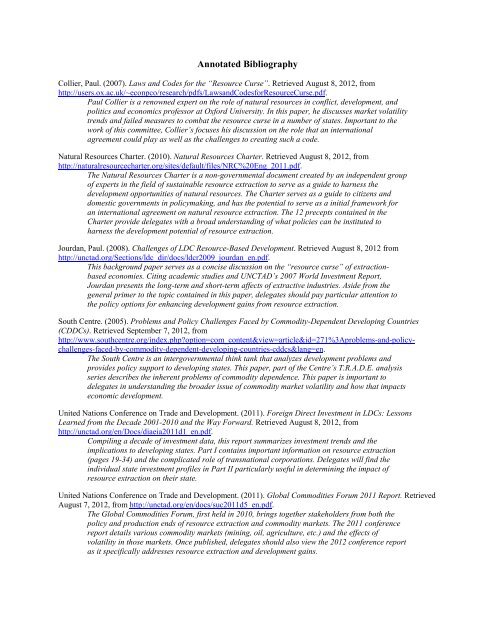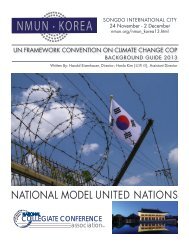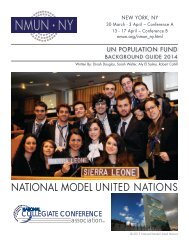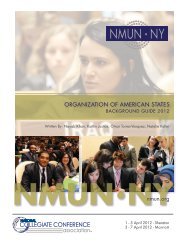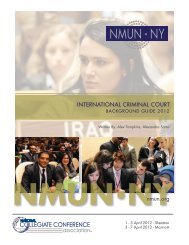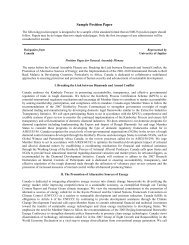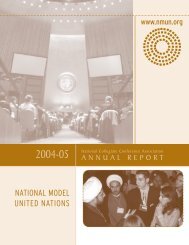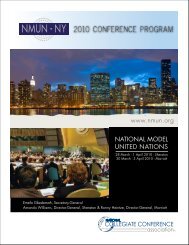UNCTAD Background Guide - National Model United Nations
UNCTAD Background Guide - National Model United Nations
UNCTAD Background Guide - National Model United Nations
Create successful ePaper yourself
Turn your PDF publications into a flip-book with our unique Google optimized e-Paper software.
Annotated Bibliography<br />
Collier, Paul. (2007). Laws and Codes for the “Resource Curse”. Retrieved August 8, 2012, from<br />
http://users.ox.ac.uk/~econpco/research/pdfs/LawsandCodesforResourceCurse.pdf.<br />
Paul Collier is a renowned expert on the role of natural resources in conflict, development, and<br />
politics and economics professor at Oxford University. In this paper, he discusses market volatility<br />
trends and failed measures to combat the resource curse in a number of states. Important to the<br />
work of this committee, Collier’s focuses his discussion on the role that an international<br />
agreement could play as well as the challenges to creating such a code.<br />
Natural Resources Charter. (2010). Natural Resources Charter. Retrieved August 8, 2012, from<br />
http://naturalresourcecharter.org/sites/default/files/NRC%20Eng_2011.pdf.<br />
The Natural Resources Charter is a non-governmental document created by an independent group<br />
of experts in the field of sustainable resource extraction to serve as a guide to harness the<br />
development opportunities of natural resources. The Charter serves as a guide to citizens and<br />
domestic governments in policymaking, and has the potential to serve as a initial framework for<br />
an international agreement on natural resource extraction. The 12 precepts contained in the<br />
Charter provide delegates with a broad understanding of what policies can be instituted to<br />
harness the development potential of resource extraction.<br />
Jourdan, Paul. (2008). Challenges of LDC Resource-Based Development. Retrieved August 8, 2012 from<br />
http://unctad.org/Sections/ldc_dir/docs/ldcr2009_jourdan_en.pdf.<br />
This background paper serves as a concise discussion on the “resource curse” of extractionbased<br />
economies. Citing academic studies and <strong>UNCTAD</strong>’s 2007 World Investment Report,<br />
Jourdan presents the long-term and short-term affects of extractive industries. Aside from the<br />
general primer to the topic contained in this paper, delegates should pay particular attention to<br />
the policy options for enhancing development gains from resource extraction.<br />
South Centre. (2005). Problems and Policy Challenges Faced by Commodity-Dependent Developing Countries<br />
(CDDCs). Retrieved September 7, 2012, from<br />
http://www.southcentre.org/index.php?option=com_content&view=article&id=271%3Aproblems-and-policychallenges-faced-by-commodity-dependent-developing-countries-cddcs&lang=en.<br />
The South Centre is an intergovernmental think tank that analyzes development problems and<br />
provides policy support to developing states. This paper, part of the Centre’s T.R.A.D.E. analysis<br />
series describes the inherent problems of commodity dependence. This paper is important to<br />
delegates in understanding the broader issue of commodity market volatility and how that impacts<br />
economic development.<br />
<strong>United</strong> <strong>Nations</strong> Conference on Trade and Development. (2011). Foreign Direct Investment in LDCs: Lessons<br />
Learned from the Decade 2001-2010 and the Way Forward. Retrieved August 8, 2012, from<br />
http://unctad.org/en/Docs/diaeia2011d1_en.pdf.<br />
Compiling a decade of investment data, this report summarizes investment trends and the<br />
implications to developing states. Part I contains important information on resource extraction<br />
(pages 19-34) and the complicated role of transnational corporations. Delegates will find the<br />
individual state investment profiles in Part II particularly useful in determining the impact of<br />
resource extraction on their state.<br />
<strong>United</strong> <strong>Nations</strong> Conference on Trade and Development. (2011). Global Commodities Forum 2011 Report. Retrieved<br />
August 7, 2012, from http://unctad.org/en/docs/suc2011d5_en.pdf.<br />
The Global Commodities Forum, first held in 2010, brings together stakeholders from both the<br />
policy and production ends of resource extraction and commodity markets. The 2011 conference<br />
report details various commodity markets (mining, oil, agriculture, etc.) and the effects of<br />
volatility in those markets. Once published, delegates should also view the 2012 conference report<br />
as it specifically addresses resource extraction and development gains.


